 For those who say they feel unable to control their health care journeys, the main reason was “lack of sufficient support in a system they don't believe is looking out for their well-being.”
For those who say they feel unable to control their health care journeys, the main reason was “lack of sufficient support in a system they don't believe is looking out for their well-being.”
The health care system “is what it is” – while most people generally like their health care, many believe they have no real control over the process or the cost, according to Maestro Health's report, “The Consumer Healthcare Paradox.”
Maestro Health surveyed 1,000 U.S. adults and found that, while 78 percent describe their health care experience as “positive,” almost the same percentage (69 percent) don't feel fully empowered to control their “health care journeys.”
Related: Disgruntled health care consumers taking matters into their own hands
“And worse, they assume the healthcare experience they have now is as good as it gets,” the authors write. “This just doesn't make sense. It is further proof of the major paradox permeating the health care industry today.”
 (Click to enlarge)
(Click to enlarge)Half (50 percent) of respondents do not think the quality of care they receive is generally equal to or greater than its cost; 79 percent think quality health care costs in the U.S. are too high; 55 percent have experienced a higher-than-anticipated medical bill; and 39 percent have chosen not to go to the doctor to avoid costs.
“Plus, there's no single source of truth,” the authors write. “Consumers say they want a single resource for all their healthcare needs. And it's clear why: they're all over the board when it comes to how often they seek out care, where they go with concerns and how they identify a facility.”
When looking for a new doctor, 44 percent turn to friends and family and 39 turn to the internet. When they have a concern about their health, 32 percent confide in family and friends and 43 percent turn to Google for help.
“Less than 40 percent of respondents said they turn to their health plan or employer when it comes to navigating the essentials of healthcare,” the authors write. “Consumers are looking to almost anything else as a source of truth or guidance with their health care.”
For those who say they feel unable to control their health care journeys, the main reason was “lack of sufficient support in a system they don't believe is looking out for their well-being.”
A number of things could improve their health care experience, including:
- “Lower costs for prescriptions, doctor's visits and other health care costs” (52 percent)
- “Being able to seek out care from any doctor or hospital” (37 percent)
- “One resource that allowed me to select a doctor, manage claims, understand and pay my bills” (28 percent)
- ” A more simple experience from scheduling appointments to paying bills” (25 percent)
- “Wider availability of doctors' appointments” (25 percent)
- “Better understanding of medical bills” (24 percent)
- “More assistance and education from my employer” (14 percent)
Bottom line: “Mind the gap,” the authors write.
“The research shows the healthcare we're used to, isn't healthcare—at least, it shouldn't be,” they write. “Consumers are conditioned to accept the status quo, which means lack of support, crazy-high bills and a system where most parties are only looking out for their bottom lines.”
Maestro Health recently launched a campaign, “This Is Not Healthcare,” which aims to uncover the fraud, waste and abuse rampant throughout the health care industry.
Read more:
© 2025 ALM Global, LLC, All Rights Reserved. Request academic re-use from www.copyright.com. All other uses, submit a request to [email protected]. For more information visit Asset & Logo Licensing.








